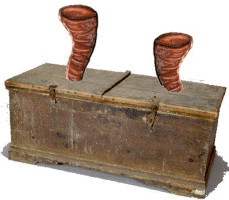
Lesson 9
Charity
In the Gospels, Jesus taught that we must not be attached to material possessions. Jesus also taught a lesson on giving. One day, Jesus was in the temple area with His disciples; He sat down opposite the temple treasury and observed how the people put money into the treasury.
Thirteen receptacles were placed in the Court of Women to receive the temple offerings. Six of these trumpet-shaped urns were specially designated to receive various offerings; most of these offerings were obligatory dues, while the rest were voluntary or “free-will” gifts.
Many rich people put in large sums. A poor widow also came and put in two small coins worth a few cents. Calling the attention of His disciples, Jesus said to them, “Amen, I say to you, this poor widow put in more than all the other contributors to the treasury. For they have all contributed from their surplus wealth, but she, from her poverty, has contributed all she had, her whole livelihood.” (Read Mark 12:41–44 and Luke 21:1-4)
Jesus commended the widow’s offering, even though it was only a few cents, because she gave all she had. Jesus’ lesson on giving is not limited to money or possessions. Giving can also be in the form of making use of the talents and abilities that God gave us to serve others. We can also give to others by giving them our help, time and support.
We are all part of God’s family. God did not create us to live in isolation without the love of others. We are called to a serve others as followers of Jesus Christ.
Charity does not only mean giving money to the poor. Charity is the theological virtue by which we love God above all things and our neighbor for the love of God.
Questions:
- At the time of Christ, what kind of offerings did the people give to the temple treasury?
- According to Jesus, why was the offering of the widow worth much more than all the other people’s offerings?
- What are the ways in which we can give to others?
- What does charity mean?